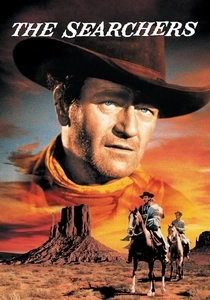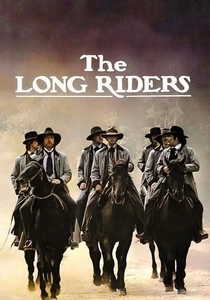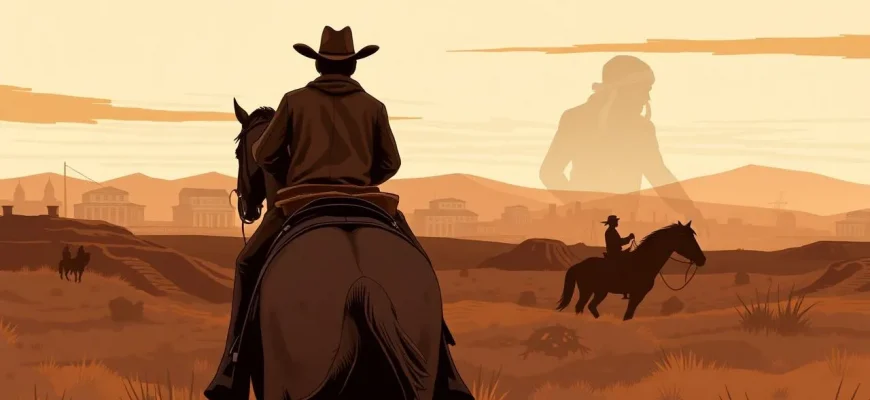The Wild West, often romanticized in cinema, was also a place where racial tensions were starkly evident. This curated list of Western films delves into the theme of racism, offering viewers not just thrilling tales of the frontier but also a profound look at the societal issues of the time. These movies provide a unique perspective on how race influenced the lives of those who lived in and shaped the American West, making them essential viewing for anyone interested in history, social justice, or simply a good story with depth.

The Ox-Bow Incident (1943)
Description: This film deals with a posse that captures three men suspected of cattle rustling and murder, exploring mob mentality and racial prejudice in a small Western town.
Fact: It was nominated for an Academy Award for Best Picture, and its themes remain relevant to discussions on justice and prejudice.
 Watch Now
Watch Now 
The Searchers (1956)
Description: John Ford's masterpiece follows Ethan Edwards, a Confederate veteran, on his quest to rescue his niece from Comanche kidnappers. The film subtly explores themes of racial prejudice, particularly through Ethan's complex relationship with Native Americans.
Fact: The film was shot in Monument Valley, which became iconic in Western cinema. John Wayne's character, Ethan Edwards, is considered one of his most complex roles.
 Watch Now
Watch Now 
The Man Who Shot Liberty Valance (1962)
Description: This film explores the myth of the West through the story of a lawyer who becomes a hero after killing an outlaw, touching on themes of race, justice, and the American Dream.
Fact: The film famously includes the line, "When the legend becomes fact, print the legend," reflecting on the nature of truth and myth in the West.
 Watch Now
Watch Now 
The Great Silence (1968)
Description: An Italian spaghetti Western set in Utah, where a mute gunslinger protects a group of outcasts from a ruthless bounty hunter, highlighting themes of justice and racial discrimination.
Fact: The film was initially banned in Italy for its portrayal of law enforcement, and it has since gained a cult following.
 Watch Now
Watch Now 
The Cowboys (1972)
Description: John Wayne stars as a rancher who hires schoolboys to drive his cattle to market, facing racial tensions when they encounter Native Americans and a gang of outlaws.
Fact: This was one of John Wayne's last films, and it was notable for its portrayal of Native Americans in a more sympathetic light.
 Watch Now
Watch Now 
Blazing Saddles (1974)
Description: Mel Brooks' satirical take on Westerns, this film uses humor to address racism, with a black sheriff appointed to a town full of racists, leading to hilarious and poignant commentary on prejudice.
Fact: The film was initially met with resistance from studios due to its controversial content but has since become a classic for its bold approach to racial issues.
 Watch Now
Watch Now 
The Long Riders (1980)
Description: This film tells the story of the James-Younger Gang, focusing on the racial dynamics and the societal pressures that led to their outlaw status.
Fact: Real-life brothers played the James-Younger brothers in the film, adding authenticity to the family dynamics.
 Watch Now
Watch Now 
The Ballad of Little Jo (1993)
Description: This film tells the story of Josephine Monaghan, who disguises herself as a man to survive in the harsh West. It explores gender roles and racial dynamics through her interactions with various characters, including a Chinese immigrant.
Fact: The film was inspired by the real-life story of Josephine Monaghan, though with significant fictional elements added.
 Watch Now
Watch Now 
Posse (1993)
Description: Directed by and starring Mario Van Peebles, this film follows a group of African American soldiers who become outlaws after the Civil War, highlighting the racial injustices they face in the West.
Fact: The film features an all-black cast, which was rare for Westerns at the time, and was shot in various locations to reflect the diverse settings of the American West.
 Watch Now
Watch Now 
Django Unchained (2012)
Description: Quentin Tarantino's homage to spaghetti Westerns, this film tells the story of Django, a freed slave, who teams up with a German bounty hunter to rescue his wife from a brutal plantation owner. It tackles racism with Tarantino's signature blend of violence and dark humor.
Fact: The film's title and some plot elements are inspired by the 1966 Italian film "Django." It was nominated for five Academy Awards, winning two.
 Watch Now
Watch Now 








